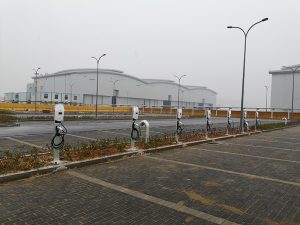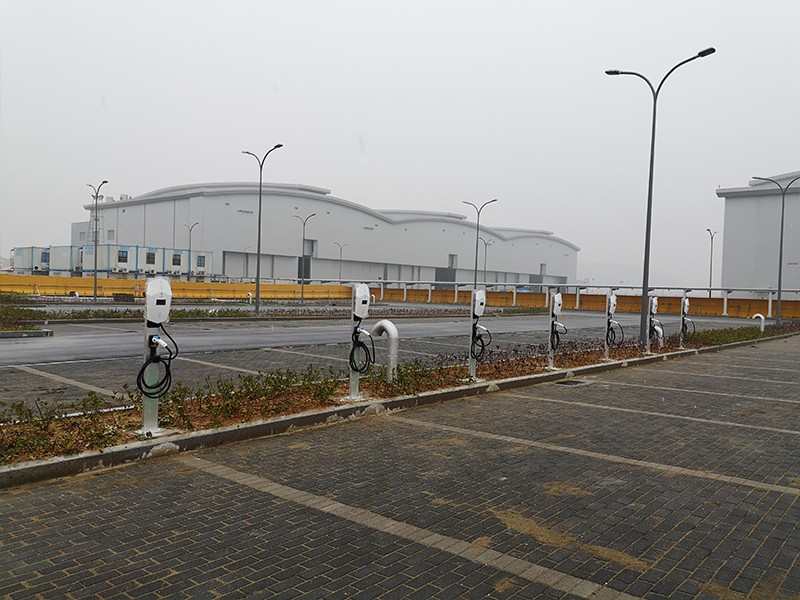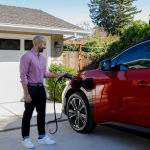As the electric vehicle (EV) market continues to grow rapidly, the demand for home charging solutions is on the rise. The 3kW EV charger, a Level 2 charging device, is a popular choice for many EV owners due to its affordability and efficiency. This comprehensive guide explores the features, benefits, comparison with other chargers, installation costs, top models, and available government incentives for the 3kW EV charger, helping you decide if it’s the right fit for your needs.

What is a 3kW EV Charger?
A 3kW EV charger is a Level 2 charging device that operates on a 240-volt circuit, delivering approximately 3 kilowatts of power per hour. It is ideal for home or workplace charging, particularly for those who drive short distances or own plug-in hybrid electric vehicles (PHEVs). Unlike Level 1 chargers, which use standard 120-volt outlets and are significantly slower, the 3kW charger offers faster and more efficient charging.
Key Features
-
Power Output: 3kW, suitable for Level 2 charging.
-
Charging Speed: Adds approximately 12–15 miles of range per hour.
-
Compatibility: Works with most EVs and PHEVs.
-
Installation Requirements: Requires a dedicated 240-volt circuit, typically installed by a professional electrician.
The 3kW charger is particularly suited for users with smaller battery capacities, such as certain Nissan Leaf models or PHEVs.
How Does a 3kW EV Charger Work?
A 3kW charger converts household alternating current (AC) to direct current (DC) to charge an EV’s battery. It connects to a 240-volt circuit, similar to those used for dryers or ovens, and is typically wall-mounted or portable, using a standard Type 2 charging cable to connect to the vehicle.
Charging Time Examples
Here are approximate charging times for common EVs using a 3kW charger (from 0% to 100%):
-
Nissan Leaf (40kWh battery): About 13–14 hours.
-
Tesla Model 3 (50kWh battery): About 16–18 hours.
-
Toyota Prius Plug-in Hybrid (8.8kWh battery): About 3 hours.
Actual charging times may vary based on vehicle efficiency, battery condition, and environmental factors.
Benefits of Using a 3kW EV Charger
The 3kW EV charger offers several advantages for home charging:
-
Cost-Effective: Lower equipment and installation costs compared to 7kW or 22kW chargers.
-
Ideal for Light Users: Sufficient for daily commutes of 30–50 miles, meeting the needs of most EV owners.
-
Overnight Charging: Leverages off-peak electricity rates to reduce costs.
-
Low Grid Impact: Places less strain on home electrical systems, suitable for older setups.
-
Eco-Friendly: Supports sustainable transportation, reducing carbon emissions.
Additionally, slower charging with a 3kW charger can benefit battery longevity, extending the life of your EV’s battery.
Comparison with Other Charger Types
To help you choose the right charger, here’s how the 3kW charger compares to other common types:
|
Charger Type |
Power Output |
Range per Hour |
Use Case |
Installation Cost |
|---|---|---|---|---|
|
Level 1 Charger |
1.4–2.4kW |
3–5 miles |
Emergency use, home backup |
Minimal (uses existing outlet) |
|
Level 2 Charger (3kW) |
3kW |
12–15 miles |
Home, workplace |
$500–$2,500 |
|
Level 2 Charger (7kW) |
7kW |
25–30 miles |
Home, commercial |
$800–$3,000 |
|
Level 2 Charger (22kW) |
22kW |
60–80 miles |
Commercial, requires three-phase power |
$2,000–$5,000 |
|
DC Fast Charger |
50kW+ |
100–200 miles |
Public stations |
$12,000+ (not for home use) |
3kW vs. 7kW vs. 22kW
-
3kW Charger: Slower but more affordable and easier to install, ideal for short commutes or small-battery vehicles.
-
7kW Charger: Nearly twice as fast, suitable for longer drives or multi-vehicle households, but costs $100–$200 more.
-
22kW Charger: Extremely fast but requires three-phase power, typically impractical for homes and more expensive.
For most home users, the 3kW charger balances cost and convenience. If fast charging isn’t a priority, it’s an excellent choice.
Installation Costs and Considerations
The total cost to install a 3kW EV charger typically ranges from $500 to $2,500, depending on several factors:
-
Charger Cost: $300–$1,000, based on brand, features (e.g., smart charging, remote monitoring), and retailer.
-
Installation Labor: $200–$1,500, depending on complexity and electrician rates ($50–$150/hour).
-
Electrical Upgrades: Adding a 240-volt circuit, breaker, or panel upgrade may cost $500–$1,000.
-
Permits and Inspections: $50–$200, depending on local regulations.
-
Location: Indoor installations (e.g., garage, $800–$1,500) are cheaper than outdoor ones (requiring weatherproofing, $800–$2,500).
Installation Considerations
-
Hire a Professional Electrician: Level 2 chargers involve high voltage, and DIY installation risks electrical issues or safety hazards.
-
Check Electrical Capacity: Ensure your home’s electrical system supports a 240-volt circuit, or budget for upgrades.
-
Connection Type:
-
Plug-in: Cheaper ($250–$800), portable, but may require a GFCI breaker.
-
Hardwired: More permanent, ideal for outdoor use ($850–$1,800), requires additional weatherproofing.
-
Top 3kW EV Charger Models on the Market
Here are some popular 3kW (or near-3kW) charger models and their features:
|
Model |
Price (USD) |
Features |
|---|---|---|
|
Wissenergy WS018 |
~$400 |
Plug-and-play, LED indicators, IP66 waterproof, suitable for indoor/outdoor use |
|
Rolec 3.6kW |
~$600 |
Smart features, app control, ideal for home and workplace |
|
Pod Point Solo 3S 3.6kW |
~$700 |
App integration, dynamic load balancing, OCPP compatible |
Note: Prices may vary by region and retailer. Check with local suppliers or online retailers for the latest pricing.
Government Incentives and Rebates
Government incentives can significantly lower the cost of installing a 3kW charger. Key programs include:
-
Federal Tax Credit: The U.S. Inflation Reduction Act offers a 30% tax credit on residential charger installation, up to $1,000, covering both equipment and labor costs (IRS Tax Credit).
-
State and Local Incentives:
-
California: The Clean Vehicle Rebate Project provides up to $2,000 for Level 2 charger installation.
-
Arizona: Tucson Electric Power customers can receive up to $500 in rebates.
-
-
Utility Rebates: Some utilities offer discounts up to $1,000 for charger installation.
To find specific incentives in your area, visit the DSIRE Database or contact your local government or utility provider.
Conclusion: Is a 3kW EV Charger Right for You?
The 3kW EV charger is an excellent choice for home charging, particularly for short-distance commuters or owners of small-battery EVs. Its affordability, ease of installation, and ability to meet daily charging needs make it a popular option. While it charges slower than 7kW or 22kW chargers, government incentives and lower costs make it appealing for new EV owners.
When deciding whether to install a 3kW charger, consider your driving habits, budget, and home electrical capacity. If you drive short distances daily and want to save on costs, the 3kW charger is a smart investment. By researching available models, understanding installation requirements, and applying for incentives, you can enjoy the convenience of home charging with ease.


